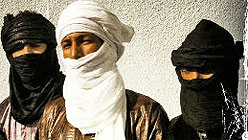Last November, when Stephen Colbert invited members of Tinariwen onto his cable TV show, he made history of sorts: Never before had a “desert blues” band gabbed about their lives — and performed — on a popular American TV show. The night, though, was bittersweet: Colbert’s conversation with the group was really just about Colbert and his stereotypes of a head-scarf-and-robe-wearing group that’s from the Sahara Desert of Mali. The audience roared at Colbert’s quips, including his introduction, “My next guests are a North African refugee band, so their living conditions are slightly better than most American bands,” and his exit line, “This is your last night before you fly black to Mali tomorrow; if I can give you some advice, don’t wear (your headscarves) in security.”
Ha-ha-ha-ha-ha-ha!
Colbert manipulated an acclaimed world-music group for a few cheap laughs, though Tinariwen (with the help of a translator) played along and laughed with Colbert and the audience. If you’re going to watch Tinariwen on a TV, get the DVD documentary, Tinariwen: Live in London. And if you’re going to get into a “desert blues” band, do it by skipping Tinariwen (for now) and listening to Terakaft, a Tinariwen offshoot that’s also from Mali, also plays hypnotic guitar-driven songs, and also epitomizes the growing popularity of Islamic pop music. Yes, Islamic pop music — or, more accurately, secular songs that emanate from Muslim countries where culture and music are intertwined in deeply significant ways.
Listen to Terakaft’s new album, Kel Tamasheq, which was officially released this week in the United States, and you’ll hear “Imgharen Win Ibda,” a song where Terakaft announces, “It’s an age favorable to war; the years to come will be full of fury,” and “Idja A Seman,” a song where the group says, “There is no one left because of the violence of war.” The war, in this case, is the Malian government’s against the Kel Tamasheq (“speakers of Tamasheq”), a traditionally nomadic Muslim people more commonly known in the West as “Tuareg,” who have lived for centuries in the desert areas of North Africa. Because of colonially imposed borders, the Kel Tamasheq have been governed (unfairly, they say) from capitals south and north of their desert areas. Many Kel Tamasheq have supported the armed takeover of Mali’s north by extremist groups, who acted in March after a military coup roiled Mali’s capital, Bamako; other Kel Tamasheq have recoiled at the imposition of strict Shariah law by the group Ansar Dine, which has banned “non-Islamic” music in the northern half of Mali.
What’s remarkable about bands like Terakaft (whose name means “caravan” in Tamasheq) and Tinariwen (whose name means “the Deserts”) is the way they’ve made so many inroads into the Western music scene. Tinariwen has opened for the Rolling Stones. Terakaft is a regular staple of music programs like Henry Rollins’ at KCRW, where the former punk-rock singer will pair Terakaft’s music with tracks from Miles Davis, Black Sabbath, Brian Eno, The Ruts, and Leadbelly. Both Tinariwen and Terakaft sell out concert halls in Europe and the United States. Terakaft is the smaller of the two bands, with just three members: Liya Ag Ablil, Sanou Ag Ahmed, and Abdallah Ag Ahmed, all of whom play electric guitar and sing.


